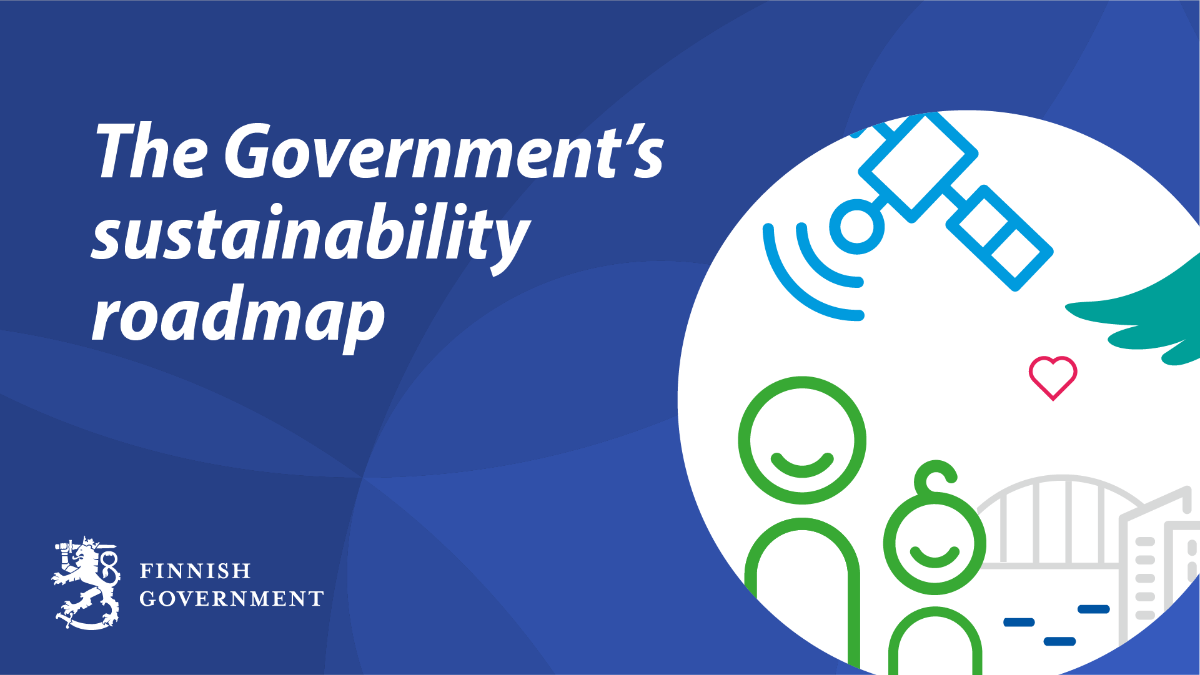Government’s updated sustainability roadmap describes development of overall sustainability during the parliamentary term

The Government’s sustainability roadmap, adopted during the mid-term policy review session in spring 2021, outlines the Government Programme’s objective of a socially, economically and ecologically sustainable society in concrete terms. The newly published, revised roadmap describes what has been achieved during this government term, what sustainability looks like in Finland in the 2020s, what kind of sustainability we will aim for in the future and what measures will be needed to achieve it.
The new roadmap, which was updated in February 2022, is in response to the needs identified by the Government in its spending limits and budget sessions related to the implementation of monitoring and further preparation of the sustainability roadmap. The sustainability roadmap analyses the effects of combining different dimensions of sustainability. This involved pilot studies on the monitoring and evaluation of policy coherence. The report also proposes making sustainability an established part of the work to support strategic decision-making by future governments.
The sustainability roadmap is linked to strategic decision-making by the Sanna Marin Government, which includes drawing up the multiannual financial framework for central government finances. Taking into account the ecological, economic and social dimensions of sustainability supports society’s resilience and capacity to respond to crises. This helps to avoid major fluctuations in the functioning of society and ensure fair progress.
Social sustainability means the ability to develop society so that people’s trust and security are maintained, disagreements can be resolved and conflicts prevented. Social sustainability is above all aimed at safeguarding the integrity of communities and societies, ensuring the realisation of fundamental and human rights and equality, securing the functioning of democracy, and preserving these from one generation to another. Social sustainability cannot be achieved without taking care of our common environment. Healthy nature is a precondition and also a prerequisite for people’s lives and wellbeing. The aim of economic policy is to increase wellbeing and ensure ecologically and socially sustainable economic growth, a high employment rate and sustainable public finances.
Finland is the best country in the world in promoting sustainability, but comprehensive sustainability requires additional measures
Finland has achieved the goals of the UN’s global 2030 Agenda for Sustainable Development and promoted the setting of objectives common to all countries. For several years now, Finland has ranked internationally as the best country for promoting sustainability, and our level of happiness related to wellbeing is among the highest in the world.
That said, the sustainable development indicators show that Finland still faces particular challenges related to social inequality, high consumption of natural resources, environmental load and shortcomings in ecological sustainability. The updated sustainability roadmap analyses Finland’s sustainability challenges in more detail and seeks new approaches for tackling them.
In line with the objectives of the sustainability roadmap, the Government has promoted a variety of measures to strengthen sustainability, many of which are currently being implemented. For example, the Energy and Climate Strategy was submitted to Parliament in June 2022, the Helmi programme to improve biodiversity and the state of habitats has been implemented in different parts of Finland, the network-based KEINO Competence Centre for Sustainable and Innovative Public Procurement is supporting public procurement, and two key government resolutions on developing cyber and information security in society were adopted in June 2021.
Additionally, extended compulsory education and free upper secondary education play an essential role in strengthening a socially sustainable education system that increases equality. Many of the Government’s economic sustainability measures are also connected to social and ecological reforms, such as strengthening the growth of the data economy and the utilisation of artificial intelligence, and creating incentives for private capital. The next step is to find stronger synergy between different programmes and link the dimensions of sustainability together in order to promote policy coherence.
Inquiries: Taina Kulmala, Ministerial Adviser, tel. +358 295 160 184 and Eeva Furman, Chief Specialist, tel. +358 295 160 824, Prime Minister’s Office, [email protected]